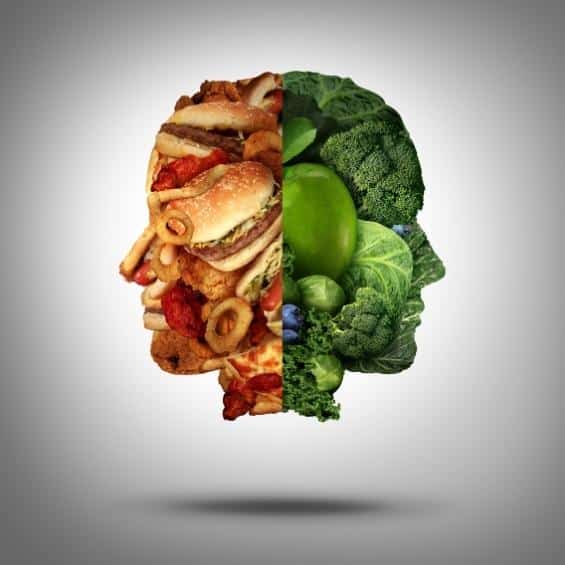
Binge Eating Disorder Treatment
in Houston, TX and Online
Do You Feel a Loss of Control Around Food?

You can learn to finally make peace with food and live the life you crave through binge eating disorder treatment.
Food fuels our bodies. But, if you struggle with binge eating, you may view food as an enemy or an obstacle.
You might begin each day with good intentions, but find yourself binge eating at night or after a stressful interaction with a coworker or partner.
Maybe you are so stressed out at work that you eat very little, only to mindlessly overeat once you get home. Sometimes, you may not even realize you are in the middle of a binge until you find yourself standing by your refrigerator, wondering how you got there.
You might often hear yourself saying, “I’ll start over tomorrow.” This pattern can diminish self-worth. Your relationship with food may be making you feel defeated, hopeless, and overwhelmed.
Maybe you have lost weight and gained it back many times, which makes you feel deeply unhappy with your body, unattractive or unhealthy.
Treatment for binge eating disorder can help put you back on track by learning new skills, coping strategies, and getting to the root of your binge eating triggers so that you can meet your true needs and find a deeper level of satisfaction and fulfillment in your life.


Many People Struggle With Binge Eating & Compulsive Overeating
Binge Eating Disorder is the Most Common Eating Disorder
If frequent overeating is causing you shame and diminishing your self-esteem, you are not alone. About 3.5% of women and 2% of men struggle with binge eating disorder and a larger number binge eat.
Binge eating is a hidden problem, and one that people of all shapes and sizes suffer from. Shame often prevents people from speaking openly about their food intake, and binge eating occurs privately.
Many people who binge eat feel a void in their lives, whether physically, mentally, or emotionally. They are unfulfilled in some deep way, but are unable to identify the true source of their dissatisfaction.
Food can serve as a temporary solution and a source of pleasure, but, after a binge, few people feel happy or satisfied.
However, through therapy for binge eating you can break free of this destructive cycle and begin to discover that you are not defined by the food you eat each day.


Therapy Can Help You Make Long-Lasting Changes in Your Life
At Eddins Counseling Group, we specialize in binge eating treatment. We move beyond food to uncover the deeply held fears and desires as well as physical imbalances that drive people to compulsively overeat. We want to help you find ways to feel good in your body and in your life.
For many people binge eating starts in response to a period of restrictive eating or any type of deprivation due to the focus on weight loss. One of the first BED treatment goals is to reduce binge eating, so the initial treatment plan focus is on reducing binge eating behaviors, thoughts, environments and other triggers of binge eating episodes.
Effective BED treatment is not a diet or a quick fix. Instead, in treatment for binge eating, you will learn to make lifestyle changes that work and address the underlying issues that are fueling the binge eating behaviors. You cannot quit food or abstain from food.
You can develop tools to manage cravings – physically, emotionally, and mentally.
Your therapist can help you unlock the unsatisfied needs that are driving you to overeat and help you cope with difficult symptoms/emotions in new ways.
Treatment for Binge Eating Disorder at Eddins Counseling Group
We offer outpatient binge eating disorder treatment at our counseling center. Binge eating disorder shows the greatest likelihood of remission compared to other eating disorders. It is treatable!
What to expect in therapy:
An initial assessment to identify physical and emotional symptoms. Referrals to other helpful medical and health professionals such as a dietitian or physician may be part of your initial treatment plan. Individual therapy is typically 1x weekly for a 45-minute session. Initial treatment goals will be established collaboratively with you, which may include:
- Skills to stop binge eating
- Healing body image, weight stigma and feelings of shame or low self-worth
- Emotion regulation and stress management skills
- Treating other mental health conditions such as anxiety, depression and trauma
- Establishing consistent eating rhythms
- Identifying binge eating triggers and skills to cope ahead
- Strategies to improve mood and physical health
Group therapy is another helpful way to treat binge eating disorder.
In group therapy sessions, you can hear what others are going through and what has helped them on their path to health. You can learn skills while gaining support to overcome your struggle with food. People find the structure and group support to be incredibly helpful in this journey.


Binge Eating Disorder Treatment FAQ's
What is Binge Eating?
People often say, “I feel like I can’t stop eating.” Critical thoughts such as, “you should not eat that”, “you’re disgusting”, or other shaming thoughts make it worse.
It is common to overeat some of the time and to eat emotionally some of the time. You might wonder if you’ve “binged” if you’ve felt that you’ve overeaten or even felt sick to your stomach after a meal.
Binge eating isn’t the same as overeating. Binge eating is more commonly followed by intense shame and self-loathing and might be experienced in a “disconnected” way.
Is Binge Eating a Disorder?
Binge eating is a form of disordered eating and can lead to intense emotional pain, but it doesn’t necessarily indicate the more serious, binge eating disorder, as a “binge” can be defined and experienced differently.
Binge eating is characterized by eating a significantly greater proportion of food in a short period of time than the average person might eat. Binge eating is also accompanied by a strong feeling of compulsion and lack of control over the binge eating.
When binge eating, people may also eat in secret or eat much quicker than usual.
Binge eating is problematic when it moves from some of the time to much of the time – two times a week or more.
If you experience recurrent episodes of binge eating at least once a week for three months or more you may have developed an eating disorder.
An eating disorder is a very serious condition not to be minimized.
Binge eating disorder (BED) is by far the most prevalent eating disorder, affecting nearly 3% of the general public and 30% of obese individuals seeking weight loss.
The Features of Binge Eating Disorder Are:
A. Recurrent episodes of binge eating. An episode of binge eating is characterized by both of the following:
- Eating, in a discrete period of time (for example, within any 2-hour period), an amount of food that is definitely larger than most people would eat in a similar period of time under similar circumstances. Unlike bulimia nervosa, the binge eating is not followed by purging behaviors.
- A sense of lack of control over eating during the episode (for example, a feeling that one cannot stop eating or control what or how much one is eating).
B. The binge-eating episodes are associated with three (or more) of the following:
- Eating much more rapidly than normal
- Eating until feeling uncomfortably full
- Eating large amounts of food when not feeling physically hungry
- Eating alone because of feeling embarrassed by how much one is eating
- Feeling disgusted with oneself, depressed, or very guilty afterwards
C. Marked distress regarding binge eating.
D. The binge eating occurs, on average, at least once a week for three months.
A binge can be experienced differently by different people. If you think you may be experiencing binge eating, it’s a good idea to consult with a therapist who can provide help for binge eating.
Your therapist will conduct a thorough assessment examining all factors that may be contributing to binge eating. You may also be referred to a dietitian not to be put on a meal plan, but to help identify what is needed to restore balance in your relationship with food.
With treatment, you can recover from binge eating disorder.
Read more about the signs and symptoms of binge eating disorder.
If you’re dealing with binge eating disorder, sometimes the drive to overeat seems to come from nowhere and feels unstoppable.
What causes binge eating?
The following have been identified as risk factors for developing BED:
- Traumatic events can contribute to later development of binge eating disorder
- Genetics and biochemistry can contribute to binge eating disorder symptoms
- Negative body image and weight stigma and weight shaming can contribute to binge eating symptoms
What we now know neurologically is that the powerful drive to eat comes from a part of the brain trying desperately to soothe the person in a time of perceived stress or threat. In fact, the drive to binge is actually the brain doing something right! When this happens, the part of the brain used to make rational decisions is, literally, offline.
The trouble is that the real solution is not always to immediately soothe or avoid, but to learn to deal with stress consciously and effectively. People with binge eating disorder eventually learn to get out of the part of the brain that wants to check out (the midbrain), and get back to the part that can make healthy, safe adult decisions (the “thinking brain” or the neocortex).
Doing this helps the brain get out of “space out” mode, and back into our healthy adult self, giving us more control over choices and behaviors. With greater practice, this also builds up the gray matter in the brain leading to greater resilience and increased ability to cope with stressors.
Why Can't I Stop Bingeing?
Often, people struggling with binge eating disorder feel they should just be able to “get it” or stop bingeing. Individuals who are overweight are often especially misunderstood or overlooked by our medical care system and given diet and exercise tips.
It’s important to understand that binge eating is not your fault nor is it a result of low will-power. Further it can often be a result of other mental health issues need to be addressed such as anxiety or depression.
Sometimes, people believe that therapy for binge eating means admitting defeat. This is not the case. By seeking therapy, you will be making a huge step toward balance and peace.
The reality is that binge eating is about much more than just food and how you eat.
In sessions, your therapist will help you fundamentally change your relationship with food, reduce binge eating behaviors, and help your body find its natural balance.
The initial goal of binge eating treatment is not weight loss though your weight may shift once you heal your relationship with your body. If you focus too much on losing weight, you may be overly fixated on an immediate, short-term result to the detriment of your own healing as it can actually trigger or cause binge eating.
In order to create lasting changes, you will need to address the core issues contributing to binge eating and create long-term goals. Yo-yo dieting slows your metabolism and hurts your body.
Weight loss is something that comes later in the process vs. right away so that it doesn’t trigger the restrict-binge cycle.
While you may not lose weight immediately, it is common to notice health numbers such as blood pressure and cholesterol dropping and overall improvement in health issues.
In therapy sessions, you can learn to identify triggers, trust your body, treat yourself with compassion, and better understand the feelings that make you want to binge. Once you heal the factors that are contributing to the binge eating, you can begin to release your body’s “weight loss resistance.”
We will also look at how your weight is impacting you and how it impacts your social interactions and quality of life. Therapy can help you identify ways to improve both physical and emotional health while working on a healthy relationship with food.
In the long run, having a balanced relationship with your body and coping effectively with binge eating triggers can help you release weight loss resistance in your body and ultimately move to a natural weight and improved physical health.
Because binge eating is so private, you may feel as though a therapist or group will judge you. Remember, you are not alone and binge eating is the most common of all eating disorders.
The therapists at Eddins Counseling Group are here to listen without judgment and help you move away from feelings of shame so you can learn to treat yourself with compassion.
Group therapy sessions can help you see how many other people struggle with binge eating. When you open up and share honestly with others, you can gain a new perspective on your relationship with food. You are not the only one, and there is hope for mental, physical, and spiritual healing.
You may also experience shame in recognizing that binge eating is a problem for you. This is actually one of the factors that fuels binge eating and we will work on helping you heal core feelings of shame if those are relevant for you.
Once you open up to the process, treating BED can feel freeing and open you up to a new way of relating to yourself, others and food.
Therapy for binge eating can help you fundamentally change your core concept of yourself. You don’t have to live with self-hatred and an obsession with food. Instead, you can clarify your values and dedicate your energy to courageously achieving your goals.
Here are some facts about binge eating disorder:
- BED can have severe impacts on physical and mental health
- Binge eating disorder symptoms often appear after a period of dieting
- People struggling with Binge Eating Disorder can be in all shapes and sizes
- Many people with binge eating disorder are overweight, but not necessarily so! Don’t discount the seriousness or let others minimize your pain by saying, “you don’t seem to have a weight problem.”
- Binge eating disorder may occur in conduction with mental illness such as anxiety, depression, bipolar disorder, or PTSD.
- Health risks from binge eating include: high blood pressure, high cholesterol, heart disease, diabetes, emotional and mental distress
- Binge Eating Disorder (BED) is the most common eating disorder, although 57% of people with BED never receive treatment
- 2.8% of the US population suffers from Binge Eating Disorder at some point in their lifetime
- 60% of people suffering with Binge Eating Disorder are female and 40% are male
- Binge Eating Disorder is often associated with symptoms of depression
- Biological factors can contribute to development of Binge Eating Disorder
- People who've dieted excessively are 12 times more likely to binge eat
- Weight does not indicate health status. People of all shapes and sizes can be healthy. Learn more at Health at Every Size.
Recovery from binge eating disorder does not mean simply learning how to "not binge", change eating habits, or stick to a diet. Recovery is much more complex and involves working with the underlying issues vs. food, which is a symptom.
Treatment is recommended for anyone struggling with binge eating, though there are different treatment options available. Psychiatric support can also be helpful, which may include medications for anxiety or depression, or Vyvanse, an approved BED medication typically used for ADHD treatment.
Therapy for binge eating includes the following therapies:
- Acceptance and Commitment Therapy
- Cognitive Behavioral Therapy
- Dialectical Behavior Therapy
- EMDR & Trauma-Focused Therapy
There is hope! Many people can and do recover from binge eating disorder. It's important to understand that while binge eating is about food, recovery is not focused on food or a specific diet plan.
Rather, recovery is a whole person approach involving learning about and healing the relationship between food and thoughts and emotions, understanding your physiology and biochemistry, learning mindfulness and acceptance skills, practicing self-care and creating meaning in your life beyond the focus on food.
You Can Change Your Relationship With Food and With Yourself
The qualified therapists at Eddins Counseling Group understand what you are going through. We have helped many people uncover the problems driving them to binge eat. You too can learn to have fun, happiness, and fulfillment in your life again. You can break the cycles of binge eating and emotional eating and learn to treat yourself and your body with love and compassion.
Get Help From a Specialist in Binge Eating Disorder Treatment
Kelsey Engdorf
Kelsey enjoys working with teens, young adults, and couples to help them build the lives they want and make meaningful changes.
BOOK AN APPOINTMENTTiara Runyon
Tiara offers a collaborative approach, fit to suit your individual needs. Her experience includes working with those facing life transitions and…
BOOK AN APPOINTMENTWhat OTHERS Are Saying
Welcoming & Great Listener
Sessions are going very well with my therapist. I like her ability to create a comfortable and open environment. She is a great conversation starter, and it’s easy to express ourselves about anything. She is very welcoming and a great listener.

















